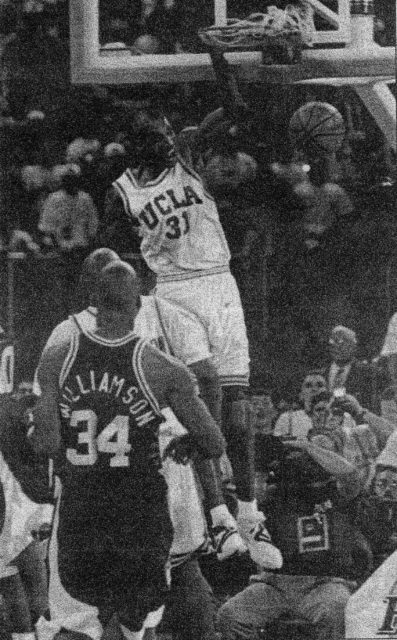One of the most historic moments of UCLA men’s basketball never happened.
It was 1995, and the No. 1 Bruins were headed into familiar territory: The NCAA Tournament. The team’s game plan, however, was far from conventional.
In partnership with fellow top regional seeds Wake Forest and the University of Massachusetts, in addition to other programs, UCLA planned to boycott its opening game of March Madness. In protest of the economic exploitation of student-athletes, 75 percent of the opening round would not have been played, according to a radio interview given by former Massachusetts player Rigo Nunez. The result would have been a million-dollar statement against the revenue reaped from the unpaid work of student-athletes.
Obviously, the strike never saw game action. The play was never run. Players, such as UCLA’s Ed O’Bannon, backed out due to fear. No NCAA Tournament would have meant no national coverage, no big-time matchups, no tape from the biggest games of the year. Draft stock would be near-indeterminable without such materials.
This week, one of the most historic moments of Missouri football did happen. Mizzou threatened not to play in response to the institutional racism at the school, illustrated by recent on-campus racial issues that the team argued were mishandled by university President Tim Wolfe.
The Tigers’ refusal to play their next game – a matchup with the BYU Cougars – would have cost the school a minimum of one million dollars in forfeited fees. The struggling team has made $30 million dollars this year from shared SEC income. Despite the cost, the Athletic Department stood with the football team, who was vocally supported by its coach, Gary Pinkel.
The movement, which was publicized through a series of tweets Saturday, led to Wolfe stepping down Monday after issuing a statement Sunday saying he had no intention to resign. The Missouri football schedule will continue as planned, but it remains to be seen whether the campus culture will arguably see meaningful change.
WE ARE ONE!!!! The coaches and administration are behind us!!!! #ConcernedStudent1950 pic.twitter.com/XCgVbz5ZUV
— HeMadeAKing (@1Sherrils_2MIZZ) November 8, 2015
Pinkel: “My players needed my support, and I supported them.”
— Mizzou Athletics (@MizzouAthletics) November 9, 2015
This isn’t just about race this about making a change standing up for what’s right! #weAreONE #ConcernedStudent1950 pic.twitter.com/NkYai0Kle5
— Trevon Walters ® (@trevon_walters) November 8, 2015
— Russell Hansbrough (@imthatnike) November 8, 2015
In life you have to make decisions that will make an impact on others in the future. #GodGotMe #AllLivesMatter
— Clarence Champ Green (@clgreen93mu) November 7, 2015
Thank you to @GaryPinkel he stood behind us when very few would.
— Ian_21nfz (@Ian_21ydh) November 9, 2015
In contrast, the 1995 basketball players were working alone against the establishment. No coaches had their backs, although the secretive proceedings made it impossible for them to get on board. No athletic departments voiced support, but there was no event or action to rally around.
Those NCAA players missed an opportunity two decades ago. Missouri proved this week that college athletes – particularly those as high-profile as football players – have tangible power. The Tigers have at least five NFL prospects on their roster with Harold Brantley, Kenya Dennis, Evan Boehm, Kentrell Brothers and Russell Hansbrough looking to go in the 2016 draft. Those players didn’t allow fear of the future to derail their plans.
O’Bannon, a UCLA Hall of Famer, led the Bruins to the NCAA title that year, scoring 30 points in the championship against Arkansas. He went on to be the ninth pick of the NBA Draft that year, graduating to a successful professional career with the New Jersey Nets.
He got what he needed from the 1995 NCAA Tournament. O’Bannon’s stats throughout the six rounds were enough to solidify his reputation as a powerful post presence.
O’Bannon left something on the court, though.
What might have been has manifested into an antitrust lawsuit led by O’Bannon against the NCAA over the past five years. The former Bruin has been nominally successful, forcing courts to make minimal changes to the definition of a student-athlete, but in reality has effected little change.
O’Bannon could have changed the lives of the 460,000 athletes that compete each year in the NCAA if he had stuck to his playbook 20 years ago. Others now have that chance.
Current UCLA junior offensive lineman Caleb Benenoch has been vocal on Twitter against the NCAA’s policy of not paying athletes. Benenoch is a major presence on the line of scrimmage and, while his words have been echoed by other athletes and teammates, they have led to no action so far.
Benenoch is only one player, but his opinions are shared by many across the NCAA. If Benenoch wanted to revolutionize the way the NCAA treats it athletes, he could.
Just ask Mizzou.
Email Fahy at [email protected] or tweet her at @clairemfahy.

